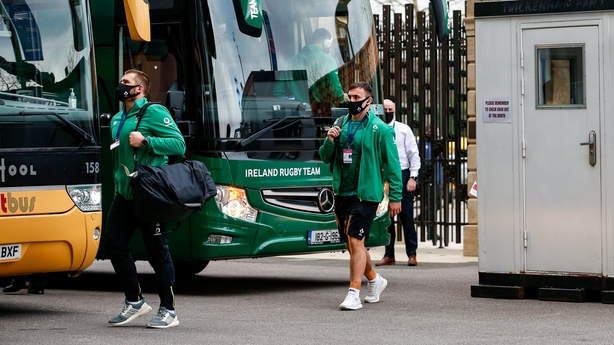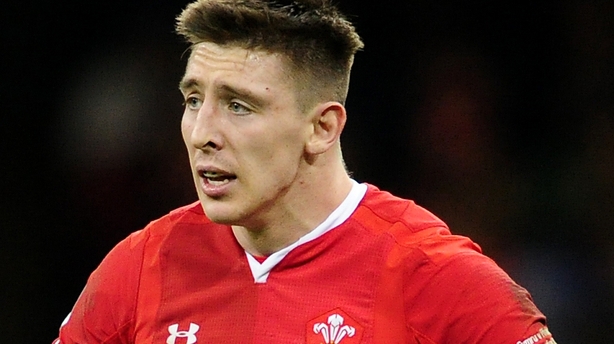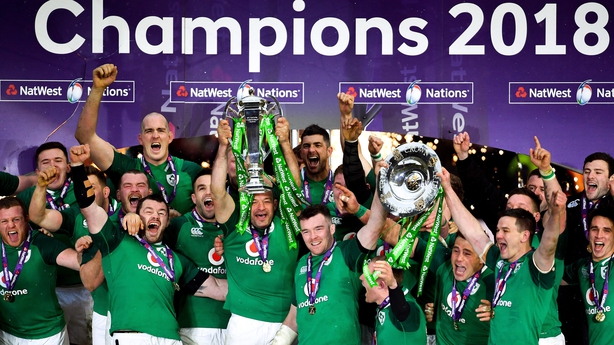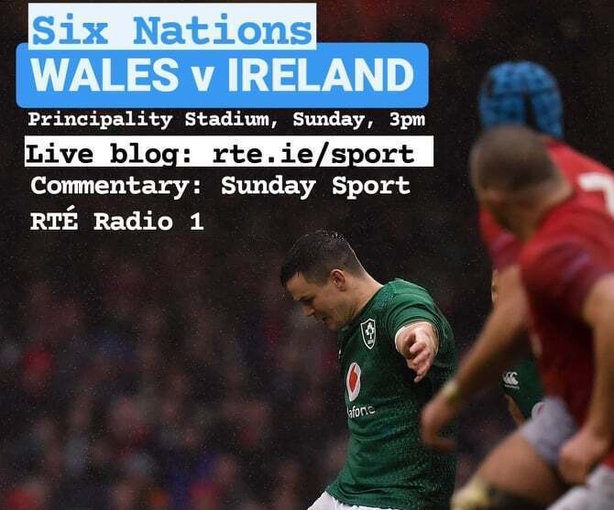It's an unusual time to be a professional athlete.
While many of us work from home during the pandemic, Six Nations titles can't be decided over Zoom.
The Irish rugby team spent 10 days in a bio-secure bubble at Carton House in Maynooth before travelling to Wales by charter flight yesterday, ahead of their game in Cardiff on Sunday.
Following the match they will return to Maynooth and spend most of the next five weeks there ahead of the games against France, Italy, Scotland and England.
The players could be forgiven for feeling weighed down by a regimen of strict rules and seeing only the same (masked) faces everyday but Enda McNulty, an All-Ireland winner with Armagh and performance coach to the Ireland team during Joe Schmidt's highly successful reign as head coach, backs them to thrive.
"They're a resilient group, extremely professional and very well managed," he told RTÉ Sport. "There's a strong culture there of excellence and following guidelines. It’s not new to them.
"The challenges they will face in a bio-bubble will be unique of course – it’s a highly uncertain and complex time – but because of the environment and the quality of the backroom staff, they will be able to adapt.
"There is very good compliance for small detail in Ireland camp. (IRFU Head of operations) Ger Carmody is extremely strong on protocol and process, managing all the small things that the players don't need to think about.

"Historically, one of Ireland's major advantages has been the social cohesion of the team," he says.
"It's a positive fun environment. There would always be someone appointed to organise the entertainment, even on the bus somebody would be organising telling jokes and singing songs after matches or training sessions.
"There a lot of good characters around the team and backroom staff. Over dinner or lunches or brunches the craic is going and there's storytelling.
"The management staff and Andy Farrell would be very aware of the need for fun and entertainment as well as the serious side in camp."
"The players would get testing done early in the morning or lunchtime and it's almost part of the BAU – business as usual"
McNulty points out that "It's normal for a professional rugby player to be in camp" and that adding things like twice-weekly PCR testing to the players' already regimented routine will cause little disruption, especially to those who were part of the bubble for the Autumn Nations Cup last November.
"The players would get testing done early in the morning or lunchtime and it’s almost part of the BAU – business as usual.
"There are so many other protocols that you wouldn’t be aware of, getting hydration testing done, getting your weight measured, that it just becomes like clockwork, and my interpretation would be that it just becomes part of the business as usual as a professional rugby player.
"There is nobody around the team hotel other than the team, the staff and the hotel staff. That's different.
"But you’re on the pitch, you’re training regularly, you’re lifting weights, you’re doing your video sessions. You might be distanced (at meals or on buses) but you’re sitting with your team.
"This is a highly adaptable group of young players, coaching staff and management staff. With all those new protocols, they’ll roll with it pretty quickly."

Wales have already banned a player, Josh Adams, for a breach of Covid guidelines, but McNulty is hopeful Ireland won't have the same issue, with a respite week that involves several days at home planned in between the home game against France (14 February) and trip to Italy (27 February).
"I'm not surprised that the Wales player broke that protocol," he said.
"It's really difficult for players, like it is for all the public, to not want to go and see their family. Everyone can appreciate that and maybe empathise with it.
"I think all the Ireland players will try their best not to break the protocols and make sure they don’t expose themselves or maybe even their families to the coronavirus.
"I know there will be really good adherence to it. Because of the culture and the leadership from people like Johnny Sexton, who will be reinforcing it over and over again that they follow the government and camp guidelines.
"Like any of us would say, if we’re travelling for three or four weeks away from our families, of course they’re delighted to get home and see their wives or girlfriends or kids. That’s a really important aspect of their emotional and mental well-being."

The alternating home-and-away structure of the Six Nations means Ireland host England and France in 2021 while travelling to Wales, Scotland and Italy.
The odd-numbered years are generally seen as providing our best shot of success - though playing in Paris and Twickenham didn't stop Ireland winning the 2018 grand slam.
Has that perceived bonus been neutralised without fans to cheer on the team at Lansdowne Road this year?
"History has proven that playing the big teams at home is an advantage to Ireland," says the McNulty CEO.
"But I think having no crowd might actually be an advantage to Ireland.
"Their leaders are so strong and will be even more vocal without a crowd.

"Peter O'Mahony, James Ryan, Garry Ringrose, Robbie Henshaw – let’s leverage these guys’ leadership capability rather than thinking about the crowd not being there, because it won’t be for the foreseeable future."
Ireland are in the unusual position of beginning a Six Nations campaign with several of their biggest stars - including O'Mahony and Sexton - out of contract in the summer.
The financial impact of Covid-19 on the IRFU has delayed and, presumably, complicated negotiations but McNulty is confident any feelings of frustration won't be carried onto the pitch.
"It can impact a player's mentality early on in the week," he suggests. "But they are so accustomed to a Test match mentality that later on in the week, nothing else matters.
"Covid won’t matter, contract negotiations won’t matter, a crowd in the stadium or not won’t matter.
"Players will delegate that to their agent and do their job, which is to perform the best that they can in an Irish shirt."
"They would never accept a mentality where second or third place would suffice"
Last year's defeats to England and France, followed by the third place finish in the Autumn Nations Cup, have lowered expectations of Ireland bringing home silverware this year.
McNulty, however, says that pessimism won't be shared in the squad.
"I know the mentality of these men and the staff. They are not wired to think about third place," he said.
"They won't be focusing on the Six Nations championship this week, they’ll only be focusing on Wales, and even at that on the first five minutes of that game.
"Ireland, with one more performance, could have won last year’s Six Nations so they’re not that far away.
"They didn’t perform as well as they could have last year or at the World Cup, and the players wouldn’t deny that, but they would never accept a mentality where second or third place would suffice.
"Irish rugby, including Leinster, Munster, Ulster, Connacht, doesn’t stand for that thankfully. It’s a culture where you’re always striving to be the best."
Follow Wales v Ireland (kick-off 3pm) on Sunday via our live blog on RTE.ie and the News app or listen live on RTÉ Radio 1's Sunday Sport.
Highlights on Against the Head, Monday at 8.10pm on RTÉ2 and RTÉ Player.


